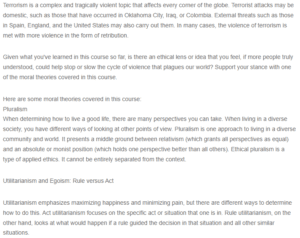Terrorism through Ethical Lenses
Most terrorist acts, for example, those done by white supremacists and Muslim extremists, among others, are motivated partly, if not wholly, by religious beliefs. Therefore, spiritually inspired terrorist attacks have become one of the most prevalent in the world, bringing about a significant loss of property and life. According to Parker (2020), in the divine command theory, morality depends on or relative to one’s faith. To explain further, when it comes to taking any action, no justifications are needed if the said action is right or wrong, as long as a divine source directed the action. Taking this into account, I believe that if people understood that morality is independent of a divine source’s will, because according to Kai Nielsen, if morality is dependent on the will of a divine being, then this means that morality is arbitrary (Boss, 2011), hence, making any evil act like murder right, as long as a divine source directs it. Further, sacred sources are known to be pure and good; no explanation exists for why such a being would command that harm be brought upon other people.
Are you interested in obtaining an original copy of “Terrorism through Ethical Lenses” ? Contact us.
Therefore, a person’s morality should be independent of any divine being rather than using their faith as the ultimate measure of morality. Further, another similar ethical lens that can be applied is utilitarianism, which argues that individuals intuitively know that pain is a moral evil (Boss, 2011). Accordingly, it does not matter where the command comes from; people naturally recognize hurting others as wrongdoing. Therefore, individuals should embrace this instinct embedded in all human beings, especially those who believe they were created. Then, he made them use his protective instinct to recognize hurting others as wrong. Moreover, a moral theory that can support my argument is utilitarianism. Accordingly, this theory calls for actions that bring happiness and oppose those that bring harm or unhappiness (Boss, 2011).
References
Boss, J. A. (2011). Ethics for life: A text with readings.
Parker, A. D. (2020). Abrahamic Religions and Terrorism: The Common Themes and Power of
Politics (Doctoral dissertation, Appalachian State University).
ORDER A PLAGIARISM-FREE PAPER HERE
We’ll write everything from scratch
Question
Terrorism is a complex and tragically violent topic that affects every corner of the globe. Terrorist attacks may be domestic, such as those that have occurred in Oklahoma City, Iraq, or Colombia. External threats such as those in Spain, England, and the United States may also carry out them. In many cases, the violence of terrorism is met with more violence in the form of retribution.

Terrorism through Ethical Lenses
Given what you’ve learned in this course so far, is there an ethical lens or idea that you feel, if more people truly understood, could help stop or slow the cycle of violence that plagues our world? Support your stance with one of the moral theories covered in this course.
Here are some moral theories covered in this course:
Pluralism
When determining how to live a good life, there are many perspectives you can take. When living in a diverse society, you have different ways of looking at other points of view. Pluralism is one approach to living in a diverse community and world. It presents a middle ground between relativism (which grants all perspectives as equal) and an absolute or monist position (which holds one perspective better than all others). Ethical pluralism is a type of applied ethics. It cannot be entirely separated from the context.
Utilitarianism and Egoism: Rule versus Act
Utilitarianism emphasizes maximizing happiness and minimizing pain, but there are different ways to determine how to do this. Act utilitarianism focuses on the specific act or situation that one is in. Rule utilitarianism, on the other hand, looks at what would happen if a rule guided the decision in that situation and all similar situations.

